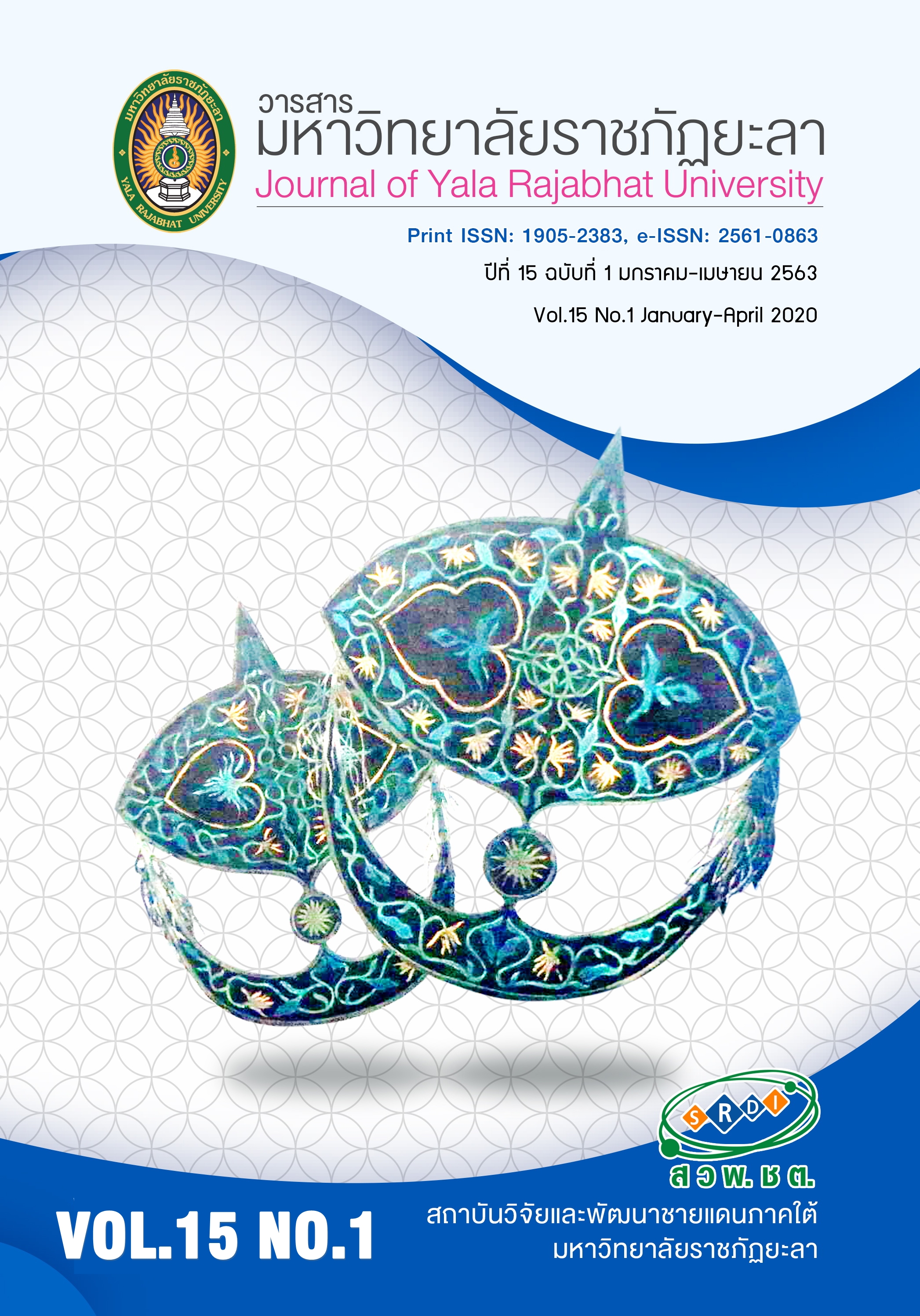การพัฒนารูปแบบการจัดการเรียนรู้โดยใช้ปัญหาเป็นฐานวิชางานช่างไฟฟ้า สำหรับนักเรียนชั้นมัธยมศึกษาปีที่ 2
Main Article Content
บทคัดย่อ
การวิจัยในครั้งนี้มีวัตถุประสงค์เพื่อพัฒนารูปแบบการจัดการเรียนรู้ โดยใช้ปัญหาเป็นฐาน วิชางานช่างไฟฟ้าสำหรับนักเรียนชั้นมัธยมศึกษาปีที่ 2 และเพื่อศึกษาผลการใช้รูปแบบการจัดการเรียนรู้ที่พัฒนาขึ้น กลุ่มตัวอย่างคือ นักเรียนชั้นมัธยมศึกษาปีที่ 2 โรงเรียนเทศบาล 1 กิตติขจร อำเภอเมือง จังหวัดตาก ภาคเรียนที่ 1 ปีการศึกษา 2560 จำนวน 31 คน ซึ่งได้มาจากการสุ่มแบบกลุ่ม เครื่องมือที่ใช้ในการวิจัยประกอบด้วย แบบทดสอบผลสัมฤทธิ์ทางการเรียนวิชางานช่างไฟฟ้า และแบบประเมินความสามารถในการแก้ปัญหา สถิติที่ใช้ในการวิเคราะห์ข้อมูลได้แก่ ค่าเฉลี่ย ส่วนเบี่ยงเบนมาตรฐาน และการทดสอบค่าที ผลการวิจัยพบว่า 1. รูปแบบการจัดการเรียนรู้ที่พัฒนาขึ้นประกอบด้วย หลักการ วัตถุประสงค์ เนื้อหา กระบวนการเรียนการสอน และการวัดผลประเมินผล ซึ่งกระบวนการเรียนการสอนประกอบด้วย 6 ขั้นตอน คือ 1) ขั้นระบุปัญหา (Define the problems: D) 2) ขั้นวิเคราะห์ปัญหา (Analyze the problems: A) 3) การศึกษาค้นคว้าด้วยตัวเองและกลุ่ม (Self and group study: S) 4) การสังเคราะห์ความรู้ (Synthesis knowledge : S) 5) สรุปและประเมินค่าคำตอบ (Summary and evaluation the answers: S) 6) รายงานผล (Reporting: R) 2. ผลการศึกษาผลการใช้รูปแบบที่พัฒนาขึ้นพบว่า 1) ผลสัมฤทธิ์ทางการเรียนด้วยรูปแบบการจัดการเรียนรู้โดยใช้ปัญหาเป็นฐาน วิชางานช่างไฟฟ้า สำหรับนักเรียนชั้นมัธยมศึกษาปีที่ 2 หลังเรียนสูงกว่าก่อนเรียน ด้วยรูปแบบการจัดการเรียนรู้ที่พัฒนาขึ้น อย่างมีนัยสำคัญทางสถิติที่ระดับ .01 2) นักเรียนมีความสามารถในการแก้ปัญหาอยู่ในระดับสูง
Article Details
บทความ ข้อมูล เนื้อหา รูปภาพ ฯลฯ ที่ได้รับการเผยแพร่ในวารสารมหาวิทยาลัยราชภัฏยะลานี้ ถือเป็นลิขสิทธิ์ของวารสารมหาวิทยาลัยราชภัฏยะลา หากบุคคลหรือหน่วยงานใดต้องการนำทั้งหมดหรือส่วนหนึ่งส่วนใดไปเผยแพร่ต่อหรือกระทำการใดๆ จะต้องได้รับอนุญาตเป็นลายลักษณ์อักษรจากวารสารมหาวิทยาลัยราชภัฏยะลาก่อนเท่านั้น
เอกสารอ้างอิง
2. Bardo, J. W., & Hartman, J. J. (1982). Urban sociology: A systematic introduction. New York: F. E. Peacock.
3. Barell. (2003). Developing more curious minds. Alexandria, VA: Association for Supervision and Curricurum Development.
4. Barell. (2007). Problem-based learning-an inquiry approach. (2nd ed.). Thousand Oaks, CA: Corwin Press.
5. Bellanca, J. & Brandt, R. (2013). 21st Century skills: Rethinking how students learn. Bloomington, IN: Solution Tree.
6. Bureau Education Standards and Development of Learning. (2007). Problem-based learning management. Bangkok: Bureau Education Standards and Development of Learning. (in Thai)
7. Bureau of Academic Affairs and Educational Standards (2009). Indicators and learning area of occupations and technology. According the Basic Education Core Curriculum B.E. 2551 (2008). Bangkok: Agricultural Cooperatives Assembly of Thailand Publisher. (in Thai)
8. Deemee, P. (2016). A Development approach for assessment learning and innovation student skills using assessment of learners method in 21st Century. Doctor’s Thesis. Naresuan University. (in Thai)
9. Illinois Mathematics and Science Academy. (2006). Problem-based learning [Online]. Retrieved September 12, 2012, from: http://pbln.imsa.edu.
10. Joyce & Weil. (2004). Models of teaching. (7thed.). London: Allyn & Bacon.
11. Khammanee, T. (2015). Science of teaching: Knowledge for effective learning orgaization. (19th ed.). Bangkok: Chulalongkorn University Publishing Com. (in Thai)
12. Ministry of Education. (2008). The basic education core curriculum B.E. 2551 (2008). Bangkok: Agricultural Cooperatives Assembly of Thailand Publisher. (in Thai)
13. Office of the Education Council. (2007). Problem-based learning management. Bangkok: Agricultural Cooperatives Assembly of Thailand Publisher. (in Thai)
14. Phongphuangphet, P., Sitti, S. & Piyakul, A. (2017). The development of science teaching model based on constructivist theory to enhance knowledge construction ability and eagerness to learn of PrathomSuksa 4 Students. Journal of Yala Rajabhat University, 12(2), 93-106. (in Thai)
15. Rayjarern, J. (2009). A development of problem-solving mathematical problems of Ubon Ratchathani Rajabhat University students. Master’s Thesis. Ubon Ratchathani Rajabhat University. (in Thai)
16. Tessaban1 Kittikachorn school. (2014). Achievement report academic year 2014 Tessaban1 Kittikachorn School. Capital District. Tak Province. (in Thai)
17. Thinkamchoet, J. (2014). A development of learning activities by using problem based learning on life and environment by action research for Mathayom Sueksa 3 Student. Master’s Thesis. Maha Sarakham Rajabhat University. (in Thai)
18. Thongrux, K. (2013). The development of an instructional model to enhance science problem solving ability based on mediated learning experience approach for lower secondary school students. Doctor’s Thesis. Naresuan University. (in Thai)


